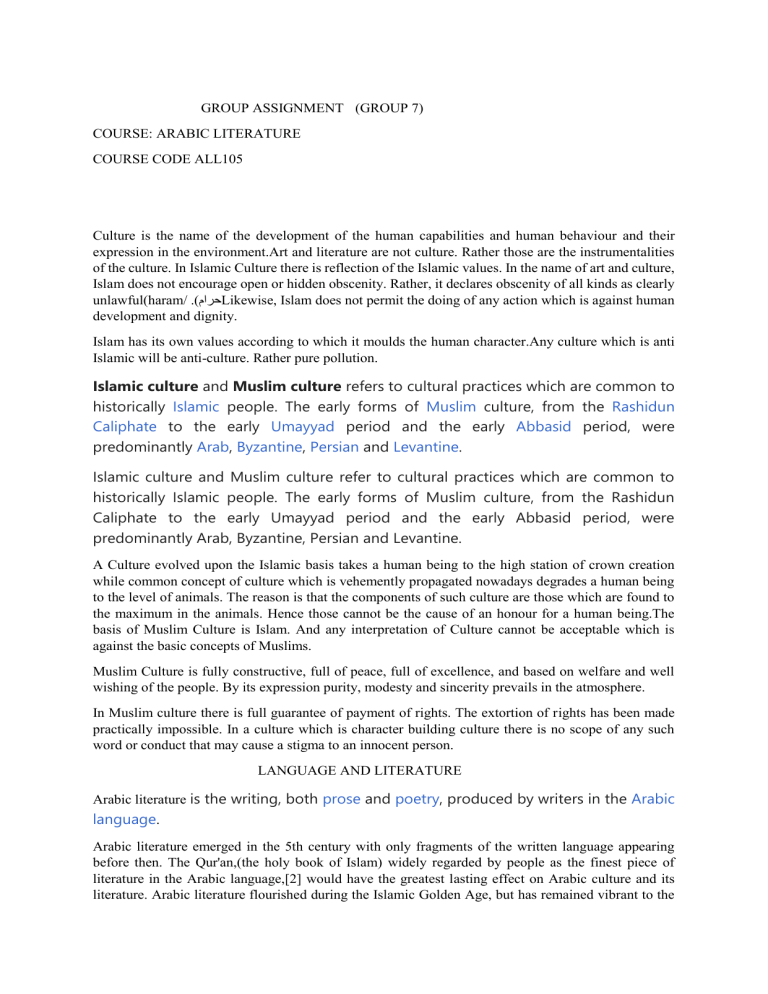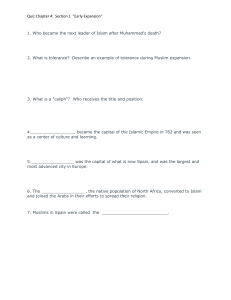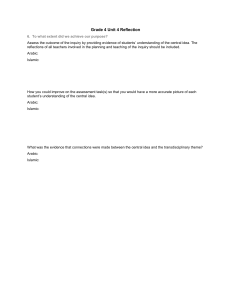Arabic Literature: Islamic Culture & Identity - Group Assignment
advertisement

GROUP ASSIGNMENT (GROUP 7) COURSE: ARABIC LITERATURE COURSE CODE ALL105 Culture is the name of the development of the human capabilities and human behaviour and their expression in the environment.Art and literature are not culture. Rather those are the instrumentalities of the culture. In Islamic Culture there is reflection of the Islamic values. In the name of art and culture, Islam does not encourage open or hidden obscenity. Rather, it declares obscenity of all kinds as clearly unlawful(haram/ .)حرامLikewise, Islam does not permit the doing of any action which is against human development and dignity. Islam has its own values according to which it moulds the human character.Any culture which is anti Islamic will be anti-culture. Rather pure pollution. Islamic culture and Muslim culture refers to cultural practices which are common to historically Islamic people. The early forms of Muslim culture, from the Rashidun Caliphate to the early Umayyad period and the early Abbasid period, were predominantly Arab, Byzantine, Persian and Levantine. Islamic culture and Muslim culture refer to cultural practices which are common to historically Islamic people. The early forms of Muslim culture, from the Rashidun Caliphate to the early Umayyad period and the early Abbasid period, were predominantly Arab, Byzantine, Persian and Levantine. A Culture evolved upon the Islamic basis takes a human being to the high station of crown creation while common concept of culture which is vehemently propagated nowadays degrades a human being to the level of animals. The reason is that the components of such culture are those which are found to the maximum in the animals. Hence those cannot be the cause of an honour for a human being.The basis of Muslim Culture is Islam. And any interpretation of Culture cannot be acceptable which is against the basic concepts of Muslims. Muslim Culture is fully constructive, full of peace, full of excellence, and based on welfare and well wishing of the people. By its expression purity, modesty and sincerity prevails in the atmosphere. In Muslim culture there is full guarantee of payment of rights. The extortion of rights has been made practically impossible. In a culture which is character building culture there is no scope of any such word or conduct that may cause a stigma to an innocent person. LANGUAGE AND LITERATURE Arabic literature is the writing, both prose and poetry, produced by writers in the Arabic language. Arabic literature emerged in the 5th century with only fragments of the written language appearing before then. The Qur'an,(the holy book of Islam) widely regarded by people as the finest piece of literature in the Arabic language,[2] would have the greatest lasting effect on Arabic culture and its literature. Arabic literature flourished during the Islamic Golden Age, but has remained vibrant to the present day, with poets and prose-writers across the Arab world, as well as rest of the world, achieving increasing success. Islamic Cultural Identity Abu Sadat Nurullah, has very correctly identified the Islamic culture based on scholarly views. He says:“Culture is socially learned and shared behaviour and ideas which are found universally among humanbeings, and it also exists in a more specific way because all cultures are not the same (Miller, 2004). Culture embraces all aspects of social life, including both thought and behaviour (Harris, 1999). Hence, culture refers to the totality of the group’s thought,experiences, and patterns of behaviour and its concepts, values, and assumptions about life that guidebe haviour and how those evolve with contact with other cultures (Jandt, 2004). This identity is not static and the changes occur when an individual from one culture is placed in, or faced with, another culture for a significant period of time (Bhugra, 2004). Cultural identity consists of several important components, including religion, religious rituals, leisure activities, languages spoken,aspirations,functioning and importance of family, dietary habits, shopping, marriage, decision making in family,employment, and feelings regarding contact with others of the same ethnic groups (Bhugra, 2004). Islam as a social religion (due to its focus on group life rather than individualistic one) has shaped its own cultural identity which is meant to be upheld by Muslims. Islamic culture is characterised by a dynamic sense of moderation. It harmonizes both the material and spiritual dimensions of human personality.It is not based on mere imitations. Islamic cultural identity is valueladen. Islamic cultural identity follows a dynamic pattern, and it is not static as it is often being misunderstood by both Muslims themselves and the secular Westerners. The majordifference between the secular Western and Islamic culture is faith in one God. The Islamic faith controls the lives of its members (Muslims) in all areas of life. These areas include spiritual beliefs, lifestyle, law, and government. It is obvious that Muslims around the world do not share the same cultural trait among themselves, but they are identical in their common cultural identity and practices in being Muslims. For instance, cultural traits of Muslims in Saudi Arabia are not similar to that of Muslims in Malaysia. However, they are guided by the similar principles and injunctions prescribed by Islam. Islamic culture is based on faith, humanism, and constructive work, which strengthens in the psyche the spirit of optimism, of confidence, to do righteous deeds, and to appreciate beauty; and is marked by its flexibility and openness to other cultures )Altwaijri, 1997).” If we make an observation of the things surrounding us, this fact will come to light that there is no contradiction in the universe and its parts. Rather they all are continually advancing towards the completion of a specific purpose unitedly and with full harmony. In summary, the knowledge of the object and purpose of one’s creation is in fact the beginning of all gnosis. According to the Holy Qur’an the appearance of human being on the earth is not without a purpose. And there is also no accidental affair in the natural evolution. Allah Almighty has mentioned the purpose of creation of Adam in the Holy Qur’an explicitly. The angels on the eternal day were much wonderstruck and asking why a creation like man who will shed blood on the earth and will create all sorts of disorder is being created. The Holy Qur’an says: 30. Behold, Thy Lord said to the angels: "I will create a vicegerent on earth." They said: "Wilt Thou place therein one who will make mischief therein and shed blood?- whilst we do celebrate Thy praises and glorify Thy holy (name)?" He said: "I know what ye know not." [2:30] Thus the concept of vicegerency is he first highest Islamic value. It is the root of all Islamic values. Being the vicegerent of the Lord Almighty it is the responsibility of man that he should not show any slackness in the matter of payment of rights of men. To discharge this responsibility, on the one side whatever is there in the heavens and the earth has been made subdued before man so that he may harness, control and use it for the welfare of mankind; and on the other side man has been inspired to understand fully well as to what is right and what is wrong. References: 1. "Minds unmade" – via The Economist. 2. Jones, p. ix. 3. Spooner, Brian (1994). "Dari, Farsi, and Tojiki". In Marashi, Mehdi (ed.). Persian Studies in North America: Studies in Honor of Mohammad Ali Jazayery. Leiden: Brill. pp. 177–178. ISBN 9780936347356. 4. Spooner, Brian (2012). "Dari, Farsi, and Tojiki". In Schiffman, Harold (ed.). Language policy and language conflict in Afghanistan and its neighbors: the changing politics of language choice. Leiden: Brill. p. 94. ISBN 978-9004201453. 5.© Ontario International Development Agency. ISSN 1923-6654 (print), ISSN 1923-6662 (online). Available at http://www.ssrn.com/link/OIDA-Intl-Journal-Sustainable Dev.html





